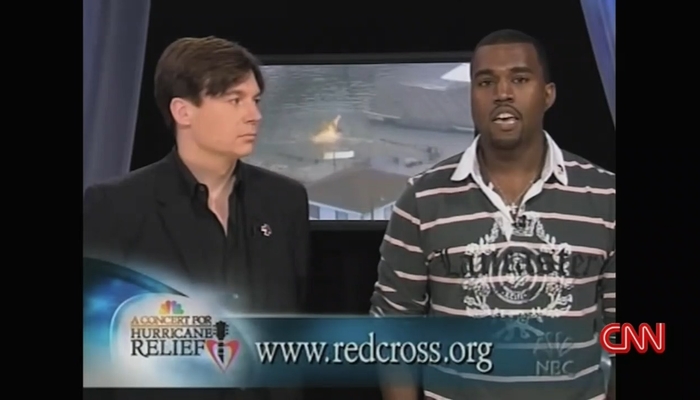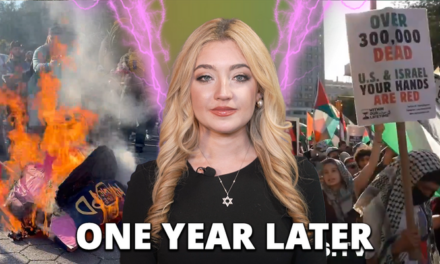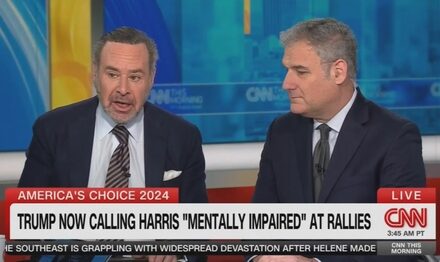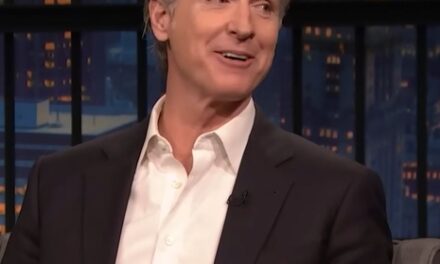We support our Publishers and Content Creators. You can view this story on their website by CLICKING HERE.

On Sunday’s episode of TV on the Edge: Moments that Shaped Our Culture, CNN devoted the hour to looking back at the infamous moment in 2005 when rapper Kanye West blurted out the accusation that President George W. Bush “doesn’t like black people” during a telethon to benefit victims of Hurricane Katrina.
The most obnoxious moment of the special came when liberal contributor Van Jones could be seen laughing hysterically as he reacted to watching the clip again, and excitedly declaring, “Oh, I love it so much! I love it so much even to this day! I love it, I love it, I love it!“
After recalling flooding of New Orleans that occurred after Hurricane Katrina dumped enough water to breach the levees protecting the city, the show got to the telethon and replayed the clip of West accusing President Bush of not caring about black people, and then showed the reactions of several mostly black public figures who took part in supplying soundbites for the documentary.
Jones could be seen excitedly reacting to the clip. Later on, media studies scholar Dexter Thomas commented: “Now, you have evidence — true evidence — that racism is not just some cop pulling a black guy over. Racism is not just some, you know, hillbilly driving by in a truck calling somebody the N-word.”
Former CNN contributor and presidential historian Douglas Brinkley could also be seen with a big smile as he rewatched the clip.
Soon there was a soundbite of CNN entertainment reporter Lisa Respers France declaring: “After Kanye said it, this was a lot of people’s faces. (nods her head) Because it sounded like he said the quiet part out loud.”
Rachel Lindsey of the Higher Learning podcast declared that the episode changed her life and compared the plight of blacks during Hurricane Katrina to the Trayvon Martin shooting from 2012.
Jones eventually recalled the selling of T-shirts that celebrated West’s comments with the message: “Kanye was right.”
Several segments also ran between Friday and Sunday previewing the episode. As Lindsey appeared on Friday afternoon with CNN’s Sara Sidner, the podcaster recalled that “it was very empowering and courageous to sit there and watch that moment.”
On Sunday as France appeared with fill-in host Jessica Dean, she proclaimed that “it was an incredible moment and a very important moment for the conversation around Katrina.”
The documentary did not mention the finding that the reason the extreme flooding of New Orleans happened was because legislators had long neglected to reserve tax funding to maintain the levees that had protected the city.
CNN News Central
October 11, 2024
9:54 a.m. Eastern
SARA SIDNER: How do you think, socially and culturally, this changed us after those moments? And, particularly, the moment where Kanye West went off script, everyone was like, “What just happened? Did he just say that?” Because people didn’t talk about Presidents like that at all. They do now. But they didn’t talk about Presidents like that.
RACHEL LINDSEY, HIGHER LEARNING PODCAST: We live in a different trend society now. Like at that moment, someone like Kanye West — a rising star — held the government’s feet to the fire. He demanded accountability. He demanded respect. And it was very empowering and courageous to sit there and watch that moment, and it made all of us want to be that.
(…)
CNN Newsroom
October 13, 2024
6:52 p.m. Eastern
LISA RESPERS FRANCE, CNN ENTERTAINMENT REPORTER: That moment was incredible because here’s Kanye West standing with Mike Myers who of course is a comedic actor. So people, I think, expected it to be like a light, funny moment, but Kanye West went completely off script, and he says George Bush “does not care about black people.” It was a shocking moment. I mean, I felt like America felt a lot like Mike Myers’ face looked at that time. He just looked like, “Wow, that really just happened.” And then, when they go to Chris Tucker who, you know, has to come out of it and just keep the whole telethon rolling along. Again, it was such a shocking moment, but it was an incredible moment and a very important moment for the conversation around Katrina. People had seen the horrendous footage like we’re looking at right there of people just trying to survive. And so, by Kanye West saying what he said, I say in the episode, I felt like he said the quiet part out loud.
JESSICA DEAN, FILL-IN HOST: Mmm. And this whole series is about these moments in television that really have shaped our society, our lives. To that end, how did the events of that day help lay the groundwork for the Black Lives Matter movement?
FRANCE; Yeah, because by taking on the President of the United States — arguably, you know, an incredibly powerful person — and by saying this and being critical of him, it laid the groundwork for people feeling more comfortable to speak out against the treatment of black and brown people in this country.
(…)
CNN’s TV on the Edge: Moments That Shaped Our Culture
October 13, 2024
9:17 p.m. Eastern
VAN LATHAN, HIGHER LEARNING PODCAST: And then, Kanye starts going. At first, it’s like this is obviously off script.
KANYE WEST, RAPPER: If you see a black family, it says they’re looting. If you see a white family, it says they’re looking for food.
VAN JONES, CNN CONTRIBUTOR: Basically, Mike Myers is trapped.
WEST: And just to imagine, if I was — if I was down there —
JONES: Can you imagine being Mike Myers standing there as this person just starts free associating racial pain?
WEST: They’ve given them permission to go down there and shoot us.
FRANK RADICE, NBC PRODUCER: I don’t know how Mike Myers did this — I’ll be honest with you.
MIKE MYERS, ACTOR: The destruction of the spirit of the people of Southern Louisiana and Mississippi may end up being the most tragic loss of all.
WEST: George Bush doesn’t care about black people.
WEST (audio): George Bush doesn’t care about black people.
WEST (audio): George Bush doesn’t care about black people.
(Several figures from the documentary are seen facially reacting to the clip of Kanye West, and Van Jones is seen laughing hysterically.)
JONES: Oh, I love it so much! I love it so much even to this day! I love it, I love it, I love it!
(…)
9:39 p.m.
DEXTER THOMAS, MEDIA STUDIES SCHOLAR: Now, you have evidence — true evidence — that racism is not just some cop pulling a black guy over. Racism is not just some, you know, hillbilly driving by in a truck calling somebody the N word.
ANDERSON COOPER: Do you think Katrina opened up people’s eyes and minds to see the unfairness of poverty — to see the unfairness of racism? I think that was a turning point.
THOMAS: It gave you very clear evidence that actually racism is an institutional thing. Racism is something that a society does to itself to its own people because it considers some people not to be really full members of that society.
JONES: It was like we didn’t count. It was like black life didn’t matter at all.
LISA RASPERS FRANCE, CNN ENTERTAINMENT REPORTER: After Kanye said it, this was a lot of people’s faces. (nods her head) Because it sounded like he said the quiet part out loud.
MICHAEL ERIC DYSON, GEORGETOWN UNIVERSITY: Kanye West is speaking a cinema that many African American people have.
MAN (on Fox & Friends): Unfortunately, whether you like it or not, there re a lot of people that believe that.
UNIDENTIFIED MAN: Do you think that like the President and other elite leaders don’t care about black people?
UNIDENTIFIED WOMAN: Yeah, I do. Bush already we know — can I say that word? Don’t care for the colored people.
TARRIONA “TANK” BALL, SINGER: I do remember feeling like, “Somebody said it.”
RACHEL LINDSEY, HIGHER LEARNING PODCAST: I thought as American citizens, the government was supposed to help you out. And a statement from Kanye West or whatever I was watching on TV or the way we were being depicted in the media showed me a different reality that I became in tune with. And the next time I had an awakening like that, I didn’t have it again until Trayvon Martin.
THOMAS: Kanye having the nerve to get on and say something that needed to be said, that, looking back now, I can look back and say that that did change the trajectory of my life. I started getting involved. I started writing, you know, when Ferguson happens.
UNIDENTIFIED MALE VOICE: A Ferguson officer shot and killed 18-year-old Michael Brown.
UNIDENTIFIED FEMALE VOICE: The shooting prompted weeks of sometimes violent protests.
THOMAS: It’s already in my mind that what I can do now is I can write about it, and I can write about it in places that people don’t want to see it.
JONES: We literally started a whole organization that is still alive to this day. The first way we made money, we sold T-shirts that said, “Kanye was right.”

 Conservative
Conservative  Search
Search Trending
Trending Current News
Current News 





